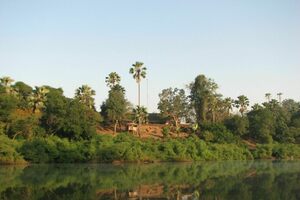Mara Kannon in Nagato, Japan

About half a mile away from the hot springs town of Tawarayama, the small temple of Mara Kannon stands alone in the forest. As its name suggests, mara is a Buddhist demon and a euphemism for the penis in Japanese. The temple is surrounded by an array of phallic objects and while phallic temples aren’t uncommon across Asia, this one is noted for its tragic background.
In 1551 during the Warring States period, samurai lord Ōuchi Yoshitaka was betrayed by his vassal and was forced to commit seppuku. His eldest son, also named Yoshitaka, was captured and killed at the age of seven, while his youngest son Kanjumaru successfully fled to the mountains disguised as a peasant girl. In 1552 however, enemies found the five-year-old Kanjumaru and murdered him at the same site as his brother. It’s said that they cut off his penis as proof that he was the son of Ōuchi.
Feeling pity for the ill-fated brothers, nearby villagers erected a temple at the site of their deaths and dedicated it to Kannon, the Buddhist goddess of mercy. Eventually, the temple became a place where people prayed for fertility and health, often offering votive tokens in the form of a phallus.
Additionally, the temple is believed to benefit those who pray inside with romantic luck, a good marital relationship, and safety in childbirth. Inside the temple are hundreds of porcelain phallic statues, which can be purchased in the town of Tawarayama. Writing your wishes on one such sculpture, as well as patting the stone phalluses outside the temple, is said to bring visitors good luck.





